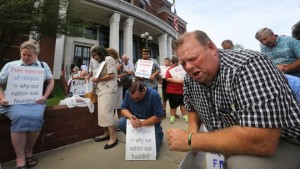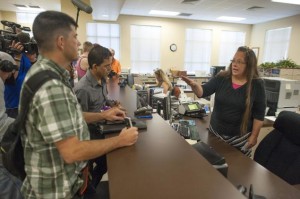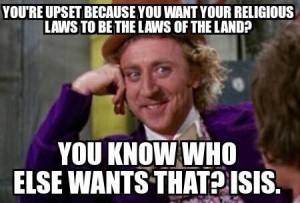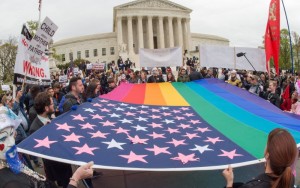Etiqueta: SCOTUS
The Slaughterhouse Cases: Interpreting the 14th Amendment
Learn more at: C-Span Landmark Cases
History: Supreme Court strikes down Obama-backed ‘prostitution pledge’ in AIDS funding
An anti-prostitution provision in a federal AIDS funding program created under the George W. Bush administration was struck down as unconstitutional by the U.S. Supreme Court on Thursday
The decision is a victory for private aid organizations that believe the provision, which required them to explicitly oppose prostitution and sex trafficking as a condition for getting federal dollars, has blocked them from serving at-risk AIDS populations, such as sex workers.
The 6-2 decision, written by Chief Justice John G. Roberts Jr., said it is a violation of the First Amendment to require people “to pledge allegiance to the government’s policy of eradicating prostitution” as a funding condition.
Associate Justice Elena Kagan, who was the Obama administration’s solicitor general before joining the court in 2010, recused herself from the case. Associates Justice Antonin Scalia and Associate Justice Clarence Thomas dissented.
The provision — sometimes called the “prostitution pledge” — was part of the U.S. Global Leadership Against HIV/AIDS, Tuberculosis and Malaria Act of 2003. The act includes the $4.5 billion President’s Emergency Plan for AIDS Relief (PEPFAR).
The law says its funds cannot be used “to promote or advocate the legalization or practice of prostitution or sex trafficking.” But it went further, asking that grant recipients adopt that same viewpoint and sign a pledge that they “explicitly” opposed prostitution and sex trafficking.
That requirement “to profess a specific belief” went too far, the majority wrote, affirming a 2011 decision by the 2nd Circuit Court of Appeals that struck down the pledge.
Rep. Christopher H. Smith, New Jersey Republican, called the ruling “extremely disappointing and tragic for all victims of sexual exploitation, including sex trafficking.”
He and other lawmakers had put the pledge into the PEPFAR program as a way to ensure that the U.S. government didn’t unwittingly fund or promote commercial sex activities — “pimps and brothel owners” — as part of the battle to stop the spread of HIV/AIDS.
“The U.S. taxpayer may well now legitimately question whether U.S. assistance being given for laudable purposes is being administered by hands that undermine those very goals,” said Mr. Smith, chairman of the global human rights panel on the House Foreign Affairs Committee.
Senate Judiciary Committee Chairman Patrick J. Leahy, Vermont Democrat, praised the ruling, saying, “I have noted time and again that we cannot successfully combat HIV/AIDS by ignoring commercial sex workers who transmit the disease.”
The Alliance for Open Society International (AOSI) and three other AIDS-fighting groups challenged the law as an unconstitutional violation of free speech.
“Today’s ruling is an important victory toward lifting the taboo that has plagued HIV prevention programs since the anti-prostitution pledge began,” said Marine Buissonniere, director of the Open Society Public Health Program.
“It is critical to work in concert with sex workers and their advocates in the fight against HIV and AIDS. Condemnation and alienation are not public health strategies,” she said.
The U.S. Agency for International Development, which oversees PEPFAR, was sued in the case.
In April, when the high court heard arguments on the case, Deputy Solicitor General Sri Srinivasan defended the law, saying Congress placed rational limitations on the use of its HIV/AIDS funds.
The government can and does set restrictions on its funding programs to find the best “partners” for its efforts, and it is reasonable to ask groups receiving funds to fight AIDS to also oppose prostitution and sex trafficking, said Mr. Srinivasan, who represented the Agency for International Development, the Department of Health and Human Services, and the Centers for Disease Control and Prevention. He has since been confirmed to join the D.C. federal appeals court.
On the other side, David W. Bowker, who represented AOSI, a group funded by billionaire George Soros, said the pledge was unconstitutional and hobbles AIDS-fighting efforts with one of the very populations that needs services.
The pledge makes funding recipients go through “an ideological purity test” and then forces them “to adopt and express the government’s viewpoint as their own,” the AOSI, Pathfinder International, the Global Health Council and InterAction said in their brief. The pledge does not even apply to other government-funded public health programs, they noted.
In their dissent, Justices Scalia and Thomas said “a central part of the government’s HIV/AIDS strategy is the suppression of prostitution, by which HIV is transmitted. It is entirely reasonable to admit to participation in the program only those who believe in that goal.”
The AOSI runs a program in Central Asia to reduce drug use and prevent the spread of HIV/AIDS, while Pathfinder International offers family planning and reproductive health care in more than 20 countries. The two other groups, the Global Health Council and InterAction, are involved in fighting AIDS through public health and collaborative efforts of nongovernmental organizations.
USA: Merrick Garland Is Named As President Obama’s Supreme Court Nominee
Federal appeals court judge Merrick Brian Garland is President Obama’s pick to fill the Supreme Court seat left vacant by the late Supreme Court Justice Antonin Scalia.
The president officially named Garland as a Supreme Court nominee as they stood before the media and a large gathering of attendees in the Rose Garden at the White House Wednesday.
Addressing the refusal by Republican leaders in the Senate to consider a Supreme Court nominee, Obama said that in Garland, he had chosen “a serious man and an exemplary judge.”
He added that in discussions about Supreme Court vacancies — the current one, as well as earlier openings — “The one name that has come up repeatedly – from Republicans and Democrats alike – is Merrick Garland.”
After a more than 20-minute introduction by Obama, Garland received a sustained round of applause and spoke to the crowd in the Rose Garden.
“This is the greatest honor of my life, other than Lynn agreeing to marry me 28 years ago,” Garland said, growing emotional and pointing to his wife.
“As my parents taught me by both words and deeds,” Garland said, “a life of public service is as much a gift to the person who serves as it is to those he is serving. And for me, there could be no higher public service than serving as a member of the United States Supreme Court.”
After describing the importance of community service in his family, Garland said, “I know that my mother is watching this on television, and crying her eyes out. So are my sisters, who have supported me in every step I have ever taken. I only wish that my father were here to see this today.”
He added, “I also wish that we hadn’t taught my older daughter to be so adventurous that she would be hiking in the mountains, out of cell-service range, when the president called.”
Garland, 63, is currently the chief judge of the U.S. Court of Appeals for the D.C. Circuit. A former prosecutor, he’s also viewed as a moderate. And he has cultivated a reputation for openness and collegiality at the D.C. Circuit, a bench that’s sometimes called the second most important in the land.
Garland will visit Capitol Hill Thursday to begin meeting with legislators, Obama said.
Speaking on a sunny mid-morning at the White House, Obama praised Garland for his “decency, modesty, integrity, even-handedness and excellence.”
With Garland standing beside him, Obama recounted the judge’s bio, from his youth in Chicago to his sacrifices to go to college and law school — sacrifices, Obama said, that included Garland selling his comic book collection.
Before becoming a judge, Garland occupied top posts in the Justice Department, where he oversaw some of the biggest investigations of the Clinton era, including the Oklahoma City bombing, the Unabomber case, and the Atlanta Olympics bombing.
Obama made particular mention of the Oklahoma City case this morning, noting the diligence with which Garland pursued the case, as well as the care and consideration he showed to victims of that attack and their families — including carrying the program from a memorial service for the fallen as he worked on the case.
The president quoted Garland saying that the case was “the most important thing I have ever done in my life.”
Garland has been a finalist for two other Supreme Court openings during Obama’s presidency; he joined the appeals court in 1997, after a long Senate delay and a 76-23 vote.
Today, Obama noted that Garland has earned bipartisan support for his work. In the past, the judge has won praise from senior Republican figures that include Utah Republican Sen. Orrin Hatch and Chief Justice John Roberts.
The president’s move to fill the seat left vacant by Scalia, who died just over one month ago, comes as conservative Republicans have pledged to block any attempt to fill the spot before a new president is sworn in next January.
Garland’s nomination opens a new chapter in what could become an epic and bruising fight over both the ideological tilt of the nation’s highest court and President Obama’s legacy.
This morning, Obama called on the Senate to hold a fair confirmation hearing of his nominee, and to hold an up-or-down vote.
Announcing his plan to fill the vacancy, Obama said, “it is both my constitutional duty to nominate a Justice and one of the most important decisions that I — or any president — will make.”
A native of Illinois, Garland attended Harvard Law School and was a clerk for Supreme Court Justice William Brennan. He then went into private practice at a law firm before taking a job as a federal prosecutor during President George H.W. Bush’s administration. He and his wife, Lynn, have two daughters.
Speculation over Scalia’s replacement had settled on Garland and two other appeals court judges in recent days, as NPR reported:
– Judge Sri Srinivasan, 49, also of the U.S. Court of Appeals for the District of Columbia
– Judge Paul Watford, 48, of the 9th Circuit Court of Appeals in San Francisco
Here’s how NPR’s Nina Totenberg described each judge, on today’s Morning Edition:
Garland is “formerly a prosecutor; he ran the Oklahoma City bombing investigation; he ran the Unabomber investigation. … The con is that because he has all that experience, he’s 63 years old, and a lot of Democrats would like somebody younger than that, who presumably would be there longer than that.”
Srinivasan is “widely respected, has worked in both Republican and Democratic administrations. He doesn’t have a long Court of Appeals record — but that’s not enough to flyspeck very carefully.”
Watford “has been on the 9th Circuit since the first Obama administration; there were 34 Republican votes against him, but there were Republican votes for him. If he doesn’t make it this time, I guarantee you his name will be in the mix next time.”
Nina also noted that when the Senate confirmed Srinivasan to the federal bench in 2013, it did so by a vote of 97-0. That standing, and his potential to become both the first South Asian and the first Hindu on the high court, led many to view Srinivasan as the favorite to be Obama’s nominee.
Once he’s nominated, Garland will likely find a contentious reception in the Senate — but Nina said the outcome of the national election could shape that process.
Referring to both Garland and Srinivasan, Nina said earlier this morning that if current Democratic front-runner Hillary Clinton wins in November, “the likelihood is that the Republicans would go ahead and confirm either one of these two men, on the theory that anybody Hillary Clinton would nominate would be more liberal.”
Before making his decision, Obama said, he consulted with legal experts across the political spectrum. And he listed three qualities he sought in a potential Supreme Court justice:
– An “independent mind, unimpeachable credentials, and an unquestionable mastery of law.”
– A recognition of “the limits of the judiciary’s role.”
– Awareness “that justice is not about abstract legal theory, nor some footnote in a dusty casebook.”
After that last point, Obama said he wanted a candidate who had experienced life outside academic or justice settings, so they would understand the way the law “affects the daily reality of people’s lives in a big, complicated democracy, and in rapidly changing times.”
“I am fulfilling my constitutional duty,” Obama said at the close of his message. “I’m doing my job. I hope that our Senators will do their jobs, and move quickly to consider my nominee.”
Ahead of Wednesday’s announcement, the White House noted that the last time the Senate refused to vote on a president’s Supreme Court nominee was in 1875 — and that “one-third of all previous U.S. presidents have had a nominee confirmed to the Supreme Court in an election year.”
In: npr
Estados Unidos: Las Lesiones en el Lugar del Trabajo no Discriminan entre Legales e Ilegales
Por: LawInfo
Las leyes para la compensación de los trabajadores fueron creadas para compensar a un empleado por lesiones sufridas mientras estaba en el trabajo. Una de las áreas más debatidas de la compensación a los trabajadores es la que se refiere a la discusión acerca de si debe otorgarse a los trabajadores que han entrado ilegalmente la misma protección en el lugar de trabajo que tienen los empleados legales. Algunos arguyen que los inmigrantes ilegales NO deberían tener derecho a la compensación cuando resultan lesionados mientras trabajan, debido a que no son empleados totalmente legales, y en primer lugar, no deberían estar aquí. Otros alegan que los inmigrantes ilegales DEBERÍAN estar cubiertos por las leyes sobre la compensación a los trabajadores, de esta manera los empleadores no tendrían el incentivo de contratar ilegales y sería un camino para evitar la responsabilidad de la compensación a los trabajadores. Los Estados varían en la forma en que consideran esta cuestión. Muy recientemente, South Carolina dictaminó en favor de dar cobertura a los trabajadores ilegales.
Curiel v. EMS
En Curiel v. Environmental Management Services la Suprema Corte de South Carolina unánimemente sentenció que los inmigrantes ilegales son elegibles para la compensación de los trabajadores si resultan lesionados en el trabajo. En ese caso Curiel, un inmigrante ilegal de México, era un trabajador de la construcción para Environmental Management Services (EMS). Mientras estaba en el trabajo, resultó lesionado en el ojo y solicitó los beneficios de la compensación a los trabajadores debido a dicha lesión. EMS rehusó pagar debido a que la compañía alegó que Curiel no era un empleado de acuerdo con la ley.
Ilegal pagar a ilegales
EMS basó su caso en el argumento constitucional consistente en que la Supremacía de los preceptos de la Constitución invalidan el ordenamiento sobre la compensación a los trabajadores de South Carolina. En términos generales, dicha Supremacía establece que cualquier ley estatal que esté en conflicto con una ley federal, es nula. EMS argumentó que la ley federal que hace ilegal la contratación de extranjeros ilegales prevalece sobre la ley estatal sobre la compensación a los trabajadores que define a un empleado como “toda persona involucrada en un empleo… ya sea que haya sido empleado legal o ilegalmente.” Así, EMS argumentó que la ley estatal no se puede ejecutar sobre los trabajadores ilegales y Curiel no podría cobrar los beneficios.
Sentenciando en el caso de Curiel
Por varias razones, el tribunal sentenció que a Curiel se le debería otorgar la compensación de los trabajadores por su lesión. Parte de esta sentencia sobre Curiel se basó en razones de política pública. El tribunal estableció que si los empleadores pudieran escapar de la responsabilidad por reclamaciones formuladas por los inmigrantes ilegales, entonces sentenciar a favor de EMS, solamente podría alentar a los empleadores a continuar contratando trabajadores ilegales.
El tribunal no fue persuadido del argumento relativo a la supremacía debido a que dispone que el texto y propósito de la ley federal de inmigración no tuvo la intención de “socavar o disminuir” cualesquiera protecciones existentes en la ley laboral estatal. Así, las dos leyes no estuvieron en conflicto entre sí. Sin embargo, el Congreso si así lo determina, puede cambiar la ley si está en conflicto.
El Futuro
Dos secciones de la Constitución permiten al Congreso actuar para prohibir sentencias similares en el futuro, la de la Supremacía antes mencionada y la de Comercio. La de la Supremacía permitirá al Congreso explícitamente anular los beneficios de la compensación a los trabajadores que sean ilegales debido a las disposiciones de la ley de Inmigración. La Cláusula de Comercio otorga al Congreso la capacidad exclusiva de regular el comercio interestatal. El Congreso podría aprobar una ley que prohiba pagar los beneficios de la compensación de los trabajadores, a los inmigrantes ilegales que resulten lesionados en el comercio interestatal. Esta clase de ley podría contemplar una larga batalla política para poder llegar a ser ley y una batalla eventual en el tribunal, en caso de ser aprobada.
En: abogados.lawinfo
USA same sex marriage: Kim Davis, Kentucky Clerk, Held in Contempt and Ordered to Jail
A federal judge has ordered a Kentucky clerk to jail after she refused to issue marriage licenses to same-sex couples.
Kim Davis, a clerk in Rowan County, was found in contempt of court on Thursday morning. She has said granting marriage licenses to gay and lesbian couples would “violate God’s definition of marriage” and infringe on her personal beliefs as an Apostolic Christian.
Davis, in tears, said on the stand that she could not comply with the judge’s order. U.S. Marshals later took her into custody.
“Thank you, judge,” Davis said as she was being led out.
District Court Judge David Bunning has said Davis is bound by an oath of office to perform her duties under the law, and ordered that she be jailed until she complied with his order to grant licenses.
Bunning has upheld the Supreme Court’s decision in June to legalize same-sex marriage nationwide, and wrote last month after the contempt lawsuit was filed that the state is merely forcing her to do her job within the law.
Before the hearing, dozens of protesters on both side of the issue clashed outside of the federal courthouse in Covington, some in support of Davis for standing up for her beliefs.
While clerks in other states have made similar refusals, Davis’ defiance is the most prominent — leading GOP presidential candidates to weigh in and casting a spotlight on her personal life, too.
It was revealed this week that she was divorced three times and had children out of wedlock before a religious awakening became a turning point in her life.
Davis, a registered Democrat, had worked as a deputy clerk for 27 years before voters in Rowan County elected her as clerk last November.
As an elected official, she can only be removed in a vote by state legislators, who don’t reconvene in the State House until January.
Despite her political leanings, she’s likely to get much support from Republicans lawmakers.
In: nbcnews
“Under God’s authority”: The case of clerk Kim Davis
Not for winning or being appointed in clerk position, this will belong to her and, from that post, she can decide who deserves a service and who does not. The exercise of public service is not about choices (It’s Not About what you believe) because is a duty, and she can´t have that discriminatory behavior against any person in relation with the goods and services that the state provides to its citizens.
Public service is mandatory for all civil servant. Public administration and the civil service is characterized by the objectivity and impartiality that is embodied in the fact prevent personal or individual elements affect the civil servant criteria when making decisions.
Public and civil servants must be objective in the line of duty. It’s like saying “think with reason and not so much with the heart”. It’s like going to a restaurant and the customer orders to the waiter “I would like to order biscuits ’n’ gravy” and the waiter answers to the consumer “sorry I don’t like biscuits ’n’ gravy, so you don’t deserve it, too”.
Finally, rule of law is a principle in public administration and because of that she can´t deny the marriage service even more if the SCOTUS ruled the same sex marriage as a right nationwide. The public servants develops their duties inside a secular state.
arturodiazf
Supreme Court says Kentucky clerk can’t deny same-sex marriage licenses
Considero que no es que por ganar o haber sido designado en el puesto, este le pertenezca a ella y, desde esa nueva posición, ella pueda decidir a quien atender y a quien no. El ejercicio del servicio público no se trata de opciones (It’s not about what you believe), sino un deber y como tal no debe discriminarse a ninguna persona respecto de los bienes y servicios que el Estado brinda a sus ciudadanos.
El servicio público es imperativo para todo servidor civil. La administración pública y el servicio civil se caracterizan por la objetividad que se materializa en el hecho de evitar que elementos personales o individuales afecten el criterio del servidor civil al momento de tomar decisiones.
Es como se dice: “pensar con la razón y no tanto con el corazón”. Ello no obsta que el servidor civil tenga un espectro de acción que le lleve a hacer lo correcto pero sin afectar negativa e injustificadamente la situación jurídica del Estado o los derechos del ciudadano.
The U.S. Supreme Court on Monday turned down a Kentucky county clerk’s request for an emergency order allowing her to continue to deny marriage licenses to same-sex couples while she appeals a federal judge’s order requiring her to do so. USA TODAY
WASHINGTON — The Supreme Court refused Monday to let a Kentucky county clerk deny marriage licenses to same-sex couples because of what she said were her religious beliefs.
The ruling, made without comment or any apparent dissents, is an early indication that while some push-back against gay marriage on religious grounds may be upheld, the justices won’t tolerate it from public officials.
In one of the first tests of the court’s June 26 decision upholding the rights of gays and lesbians to marry, Rowan County Clerk Kim Davis had argued that her Christian faith prevented her from recognizing such marriages.
Rather than deny only same-sex couples, which the high court had said would be unconstitutional, she chose to stop issuing marriage licenses altogether — and was sued by same-sex and opposite-sex couples.
Davis argued that her refusal was not a major burden for the couples, since Kentucky has about 136 other marriage-licensing locations. But federal district and appeals court judges had refused to grant her wish, forcing Davis to seek the Supreme Court’s intervention. Her petition was filed late last week by the conservative legal group Liberty Counsel.
“If a (same-sex marriage) license is issued with Davis’ name, authorization, and approval, no one can unring that bell,” the petition said. “That searing act of validation would forever echo in her conscience.”
The high court’s ruling doesn’t end Davis’ challenge, still pending at the U.S. Court of Appeals for the 6th Circuit — the same appellate court that previously allowed Kentucky, Michigan, Ohio and Tennessee to block same-sex marriage before being overruled by the Supreme Court. But it means that in the meantime, her office must issue marriage licenses.
En: usatoday
SCOTUS: Kentucky clerk must issue same-sex marriage licenses
KENTUCKY — The Supreme Court on Monday night, August 31st denied an emergency application from a Kentucky clerk who has been refusing to issue marriage licenses because of her religious objections to same-sex marriage.
The clerk, Kim Davis, sought to put a lower court ruling on hold pending appeal, and in a one-page order the Supreme Court refused.
Davis is now faced with a lower court order that her office begin issuing licenses effective Monday.
The order marks the first time the issue of same-sex marriage has come back to the justices since they issued an opinion last June clearing the way for same-sex couples to marry nationwide.
Davis, of the Rowan County Clerk’s office, has refused to issue any marriage licenses since the decision — Obergefell v. Hodges — came down. She is an Apostolic Christian who says that she has a sincere religious objection to same-sex marriage. Other clerks in the state have expressed concern, but Davis is the only one turning away eligible couples.
In Court papers, lawyers for Davis said that her “conscience forbids her from approving a (same-sex marriage) license — because the prescribed form mandates that she authorize the proposed union and issue a license bearing her own name and imprimatur.”
“In her belief,” the lawyers wrote, “(same-sex marriage) is not, in fact, marriage.”
They said issuing a same-sex license would amount to a “searing act of validation” that would “forever echo in her conscience.”
En: fox6now
Kentucky clerk takes same-sex marriage license battle to US supreme court
Rowan County clerk Kim Davis asks the highest court for permission to deny marriage licenses to same-sex couples on grounds of religious freedom
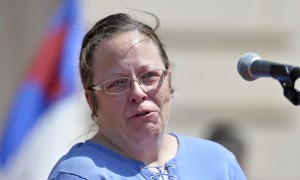
Rowan County Kentucky clerk Kim Davis shows emotion as she is cheered by a gathering of supporters during a rally on the steps of the Kentucky state capitol on Saturday. Photograph: Timothy D. Easley/AP
Two months after it legalized gay marriage nationwide, the US supreme court is being asked by a Kentucky county clerk for permission to deny marriage licenses to same-sex couples.
Rowan County clerk Kim Davis objects to same-sex marriage for religious reasons. The supreme court says the constitution guarantees gay people have the right to marry, but Davis contends the first amendment guarantees her the right of religious freedom.
She stopped issuing all marriage licenses the day after the supreme court effectively legalized gay marriage nationwide in June.
Two gay couples and two straight couples sued Davis, arguing she must fulfill her duties as an elected official. A federal judge ordered Davis to issue the licenses and an appeals court upheld that decision. Davis’s lawyers said they petitioned the supreme court on Friday to delay that decision until her appeal is finished, a process that could take months.
Her attorneys with the Christian law firm Liberty Counsel wrote in their appeal to the court that Davis is seeking “asylum for her conscience”.
Justice Elena Kagan, who joined the majority opinion that effectively legalized gay marriage across the US, will hear Davis’s case.
University of Louisville law professor Sam Marcosson said he believes Kagan will deny Davis’s request based on the court’s earlier decision.
Davis has refused to comply with several court orders in recent weeks, turning away gay couples over and over. She says they could easily drive to a nearby county to get a marriage license. But gay couples argue they have a right to get a marriage license in the county where they live, work and pay taxes.
Davis has said she will not resign her $80,000-a-year job and will never issue marriage licenses to same-sex couples – even if the supreme court denies her request.
“If a (same-sex marriage) license is issued with Davis’s name, authorization and approval, no one can unring that bell,” she wrote the court. “That searing act of validation would forever echo in her conscience.”
Her attorney, Jonathan D Christman, wrote that forcing her to issue licenses is akin to forcing a person who objects to war into the battlefield, or forcing a person against capital punishment to carry out an execution.
Davis cannot be fired because she is an elected official. The legislature could impeach her, but that is unlikely given that many state lawmakers share her beliefs. The Republican president of the state senate spoke at a rally last week in support of Davis.
The gay couples that sued her could ask US district judge David Bunning to hold Davis in contempt. That would trigger another court hearing and would likely include testimony from Davis herself. The judge could then order hefty fines or even put her in jail until she complies with the order.
En: theguardian


